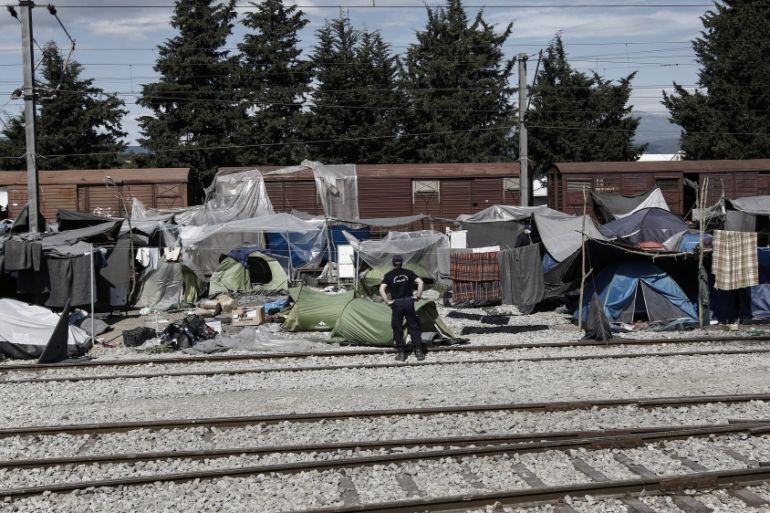Greece continues eviction of refugees from Idomeni
More than 2,000 refugees and migrants so far moved from makeshift camp on Macedonia border to shelters in Thessaloniki.

Greek police have continued efforts to evict more than 8,000 refugees and migrants congregated at the makeshift Idomeni camp, as the European Parliament’s president called the rejection of refugees by European countries a “disgrace”.
On Wednesday, the forced eviction continued for a second consecutive day. Greek government spokesman George Kiritsis told Al Jazeera that at least 2,031 camp residents were bussed to shelters in a nearby city a day earlier.
Keep reading
list of 4 itemsPalestinian Prisoner’s Day: How many are still in Israeli detention?
‘Mama we’re dying’: Only able to hear her kids in Gaza in their final days
Europe pledges to boost aid to Sudan on unwelcome war anniversary
|
|
During its peak, some 14,000 refugees and migrants were bottlenecked at Idomeni after Macedonia sealed its border and the Balkan route to Western Europe came to an end due to border closures across the region in March.
In an interview published by the German newspaper Neue Osnabrucker Zeitung on Wednesday, European Parliament President Martin Schulz said the conditions at Idomeni were “a disgrace for those [EU] member states which are not willing to accept refugees and are leaving Greece alone with this problem”.
Bulldozers ploughed through many of the tents in the camp, while authorities informed refugees they would not be permitted to return and then bussed them to official government shelters near the coastal city of Thessaloniki.
“Tomorrow we will also be moving people at a slower place because we are prioritising cleaning the railway line [connecting Greece to Macedonia], which has been closed for almost two months,” Kiritsis said, adding that more than 5,000 people remain at Idomeni.
READ MORE: Anger in Greek refugee camp after Idomeni eviction
Kiritsis said authorities will only allow asylum seekers to complete the asylum and EU relocation programme applications at government-recognised camps.
![Bulldozers razed tents throughout Idomeni as dozens of buses transported refugees to Thessaloniki on Wednesday [Yannis Kolesidis]](/wp-content/uploads/2016/05/39eec8eaff524df8bf73bd074e7b1ab6_18.jpeg)
‘Dire need of improvements’
Fleeing war, conflict and economic devastation, more than 190,000 refugees and migrants have reached European shores by boat so far this year, according to the United Nations refugee agency (UNHCR). Last year, more than a million people crossed the Mediterranean to make it to the continent.
Earlier this month, however, the EU border agency Frontex reported that arrivals in April reflected a 90 percent decrease from the previous month due to the EU-Turkey deal to severely restrict boat departures from Turkish coasts.
Stella Nanou, a Greece-based communications associate for the UNHCR, said that most of Idomeni’s residents are exhausted from the poor conditions.
“Conditions are extremely difficult in Idomeni,” she told Al Jazeera. “Last week, there was heavy rainfall. It is not a place for humans to be.”
Nonetheless, Nanou expressed concern over the refugee camps where Idomeni’s displaced residents will be transferred.
“Most of the camps already host a number of refugees, while others are new facilities inside former industrial buildings,” she said.
READ MORE: Macedonia border closure leaves refugees with no hope
“Conditions vary in these facilities. Some of them meet basic standards of humanitarian needs, but many are in dire need of improvements.”
The overall success of the evacuations in the coming days will depend on the response of Idomeni’s remaining refugees, many of whom are deeply distrustful of Greek authorities.
Milena Zajovi Milka, a member of the Are You Syrious? activist group, explained that “only a fraction” of Idomeni residents accepted the government’s offer to voluntarily relocate in recent weeks. Many are holding out hope that the border will reopen.
“Thousands of refugees chose to stay in Idomeni after getting discouraging reports from others who were to relocated recently. With the eviction going on, many have decided to go to the smugglers,” she told Al Jazeera.
“Some others are also hiding in nearby locations, hoping to return or go somewhere else [in the EU] after the eviction.”
![More than 5,000 refugees and migrants remained in Idomeni after Tuesday's evictions [Yannis Kolesidis/EPA]](/wp-content/uploads/2016/05/efd6c750064c46a59aba7918eccddec7_18.jpeg)
Media blackout
Greek authorities have barred all journalists who are not from the state-run ERT television and the ANA-MPA news agency from reaching Idomeni as the evacuation continues.
The country’s main opposition party blasted the government for banning private media and international reporters from covering the operation.
“This is a censorship operation that harms the freedom of the press and exposes the country internationally,” Giorgos Koumoutsakos of the New Democracy party said in a statement.
PHOTOS: Dashed dreams on Macedonian border
Police have also been accused of restricting access to medical aid groups and other NGOs, including Doctors Without Borders (MSF).
“There is a huge police presence up here, and NGOs have very restricted access,” MSF’s Katy Athersuch told Al Jazeera, explaining that only a fraction of the organisation’s staff has been allowed into the camp since Tuesday.
Those left in #Idomeni tell us they are desperate. This elderly woman from Syria was up early this morning… pic.twitter.com/KJKyptsr5Q
— MSF Sea (@MSF_Sea) May 25, 2016
“Many people here are afraid, scared and a bit hopeless. They are crying because they don’t know what’s ahead of them,” Athersuch said, adding that Idomeni’s residents were not properly informed about the eviction and their destinations.
Follow Patrick Strickland on Twitter: @P_Strickland_